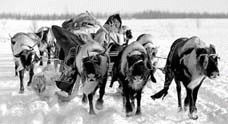SIBERIA BOUND
Published 12:00 am Saturday, February 7, 2004

- Reindeer are used by some native Siberians to pull sleds and wagons. (Submitted photo).
By Dick Mason
Observer Staff Writer
From saving natural resources to saving souls.
This is the unlikely and inspiring life course being followed by one Whit Weatherford, a former Northeast Oregon resident.
Weatherford served as a biologist for the Forest Service for 15 years, including 12 in Northeast Oregon, before making a life-changing discovery he had been called by God to serve as a missionary.
Next came a painful, heartfelt decision giving up a job he loved and enrolling at Trinity Baptist College in Jacksonville, Fla., in January 2003.
"It was no easy decision. I was 40 years old; I had been out of college for 15 years. I had a successful, if not a completely satisfying career as a professional wildlife biologist. … I loved the Blue Mountains. I didn’t want to leave,” Weatherford said.
Still, he decided to change his career course. Today he is two years away from graduating from Trinity Baptist and beginning work as a missionary in Siberia. This summer he will travel to Krasnoyarsk, a city of 1.3 million people in south-central Siberia, to work as a missionary for eight weeks.
The summer trip will be an introduction to an area where Weatherford hopes to work as a full-time missionary after graduating.
Although Weatherford has never been to Siberia, he has studied the area extensively. He is finding many striking similarities to the Blue Mountains, including some of the same natural resource issues that Northeast Oregon faces.
He believes that his experience will help him relate to the people of Siberia. In Northeast Oregon, Weatherford’s work included addressing issues concerning the protection of fish and wildlife listed by the federal government as threatened or endangered.
In Siberia he wants to show the people how natural resources can be protected through collaborative stewardship, in which groups of people work together to protect and manage forest land and other resources.
Siberia’s resources are at risk because they are being "brazenly extracted” in part because Russia has few laws addressing activities such as mining and logging.
From a scenic standpoint, Weatherford is struck by Siberia’s large stands of larch that turn yellow in the fall.
"It looks like there are hills of gold,” Weatherford said.
In Krasnoyarsk, he will stay with another missionary based there and spend much time helping young people. He will coach and referee youth sports and help teenagers who show an interest in the Gospel.
He also plans to take a trip up Yenisey River and into the outback to visit an Evenki village. The land occupied by the Evenk is similar to Northeast Oregon, with "forested mountains, wild rivers and broad meadows and plains that finally give way to the barren tundra in the far north.”
The Evenki people are facing a potential crisis because much of the forest land they live on is being threatened by unregulated mining and logging.
Loss of forest land will have dramatic impact on the Evenki people because of their reliance on reindeer. Since ancient times the Evenki have been nomadic herders of reindeer. Domesticated reindeer provide a reliable source of meat, milk, hides for clothing, as well as animals for pulling sleds. The Evenk even ride reindeer as people in Northeast Oregon ride horses.
Destruction of forest land will have a dramatic impact on reindeer because they rely on lichen that grows on trees, Weatherford said.
The Evenki people rely on reindeer even more than Native Americans of Northeast Oregon depended on elk.
Weatherford said his experience in Northeast Oregon will help him connect with the Evenki people.
"It’s my desire to use my knowledge and experience to endear myself to the Evenki people.”
Weatherford lived in Northeast Oregon from 1991 until about a year ago, making his home in La Grande, Ukiah, Dale, Unity and Wallowa.
There was a time when Weatherford felt that the years spent working as a biologist had robbed him of time to work as a missionary for the Lord.
"I said, ‘Lord, I wasted 15 years of time in which I could have done work for you,”’ Weatherford said.
Today he feels much differently.
"God was leading me to a place so similar to Northeast Oregon. All of that time I was making a connection with native Siberians I never would have made,” Weatherford said.
Today it is much easier to bring the gospel to the Evenki people for two reasons. First, following the fall of the Soviet Union and communism, missionaries have been allowed into Russia. Second, Soviet expansion resulted in the spread of the Russian language among native groups.
"The one good thing about communism is that it forced all the people to learn one language,” Weatherford said.
Previously the people of Siberia spoke a diverse mix of languages.
"Now, instead of 26 to 29 languages dialects to learn, missionaries (in Siberia) need to learn only one,” Weatherford said.
The future missionary has read much about Siberia.
"I am falling in love with a place I have never been to,” Weatherford said.
Weatherford does not believe that his mid-life move took an act of courage.
"I didn’t feel that I was being that brave by surrendering to God’s will," he said, "because I truly believe that this is God’s will.”






